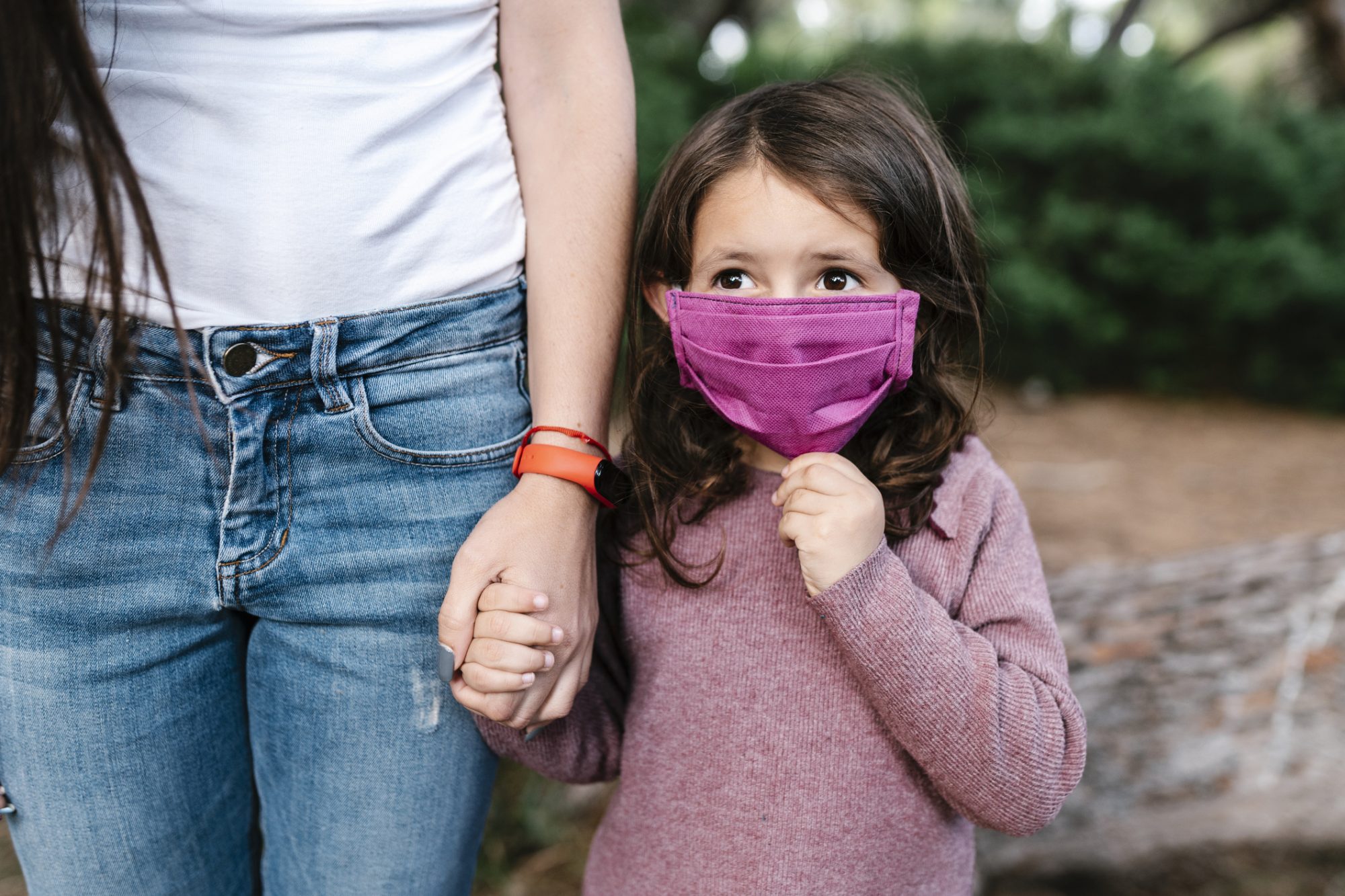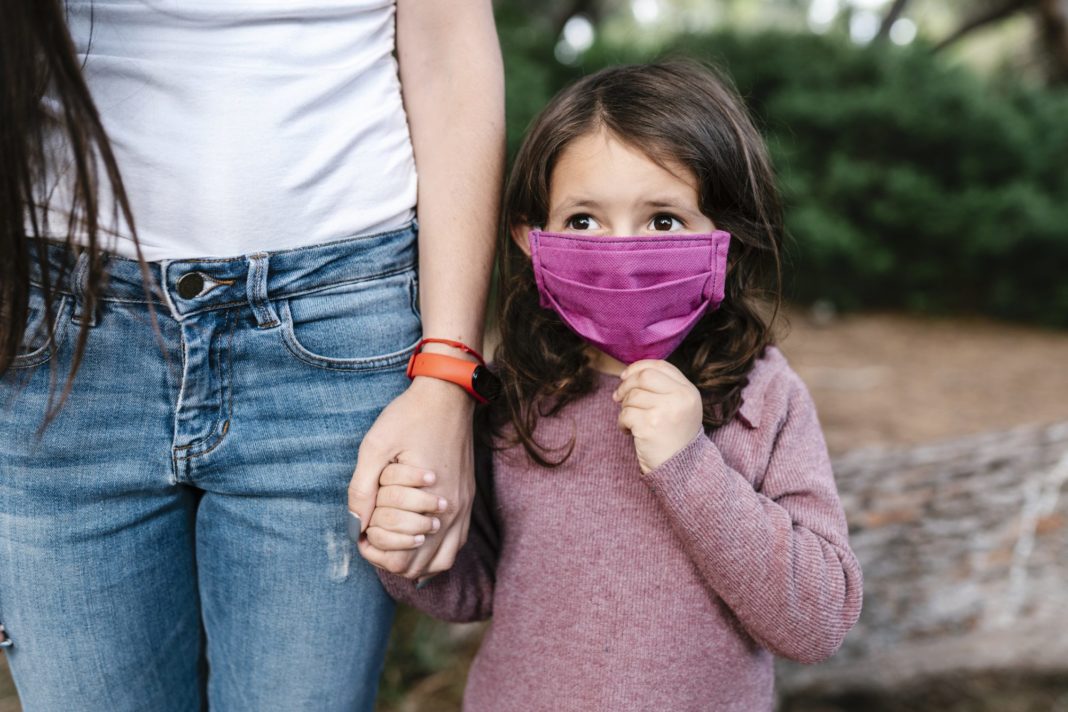Sa'iyda Shabazz says her 7-year-old son has major vaccine envy. He watched Shabazz and her partner, Beth Ryne, get vaccinated so he knows there is a light at the end of this pandemic tunnel, just not for him yet.
"He's very much at a point where he is very envious of everyone who is vaccinated because he's not," says the Los Angeles-based writer.

With easing restrictions and more than 40 percent of Americans now fully vaccinated, according to the Centers for Disease Control and Prevention (CDC), many are enjoying activities without masks, a signal that the pandemic has turned a significant corner.
But one group still cannot reap the benefits of a post-vaccine life: kids under 12 years old are still not eligible to be vaccinated, although trials are underway. For their grown-ups, it's a strange time of navigating the newly restored freedom to go maskless while ensuring the safety of their young children. It can also be confusing for many families as mask rules are changing rapidly and rules are easing up around the country. But the CDC recommends those who aren't vaccinated still wear masks in crowded outdoor areas or during activities with close contact.
Developmentally, young children mirror their grown-up's behavior, so what should you do if you can safely ditch your masks, but your children still need to keep theirs on? Here's how experts say parents can navigate this.
See Where Your Child is At
Despite the CDC saying in May that fully vaccinated people could resume life without masks, parents like Shabazz are choosing to stay masked when their children need to be masked. "I think our biggest thing is that we continue to model proper behavior," she says.
Is that necessary? According to Laura Markham, Ph.D., author and clinical psychologist, modeling behavior is the most effective way to teach kids. Psychiatric mental health nurse practitioner and mom to a 6-year-old, Aparna Kumar, Ph.D., M.P.H., CRNP, agrees, adding parents of young children would benefit from keeping their masks on when they are with their unvaccinated kids—especially when indoors and when close to other people.
But that won't be needed for every parent since some children may have an easier time keeping their mask on while their parents have theirs off. Many children have gotten used to wearing masks, says Dr. Kumar. For other kids it may be much harder, especially if they are dealing with pandemic-related anxiety. "If the child's worried about the parent being out in public without a mask, they need to put one on to make their child feel safer," says Karen Longanbach, a licensed counselor in Canton, Ohio, who has talked to many kids feeling anxious about their safety.
During the pandemic, she has seen children develop obsessive-compulsive disorder with hand-washing and mask-wearing. According to a May 2021 report from the Kaiser Family Foundation, the mental and emotional health of young children has indeed worsened as a result of the pandemic, with some kids dealing with increased irritability, clinginess, and fear.
In cases like these, it's important for parents to be understanding of their child's fears and help them feel more comfortable. "Parents need to pay attention to their child's fear about COVID even if they don't have that same fear," says Loganbach. "And respect that a child might not be ready to give up their mask."
To see where your kid stands, have age-appropriate conversations about masks and ask questions. A good starting point might be to review the CDC guidelines, advises Loganbach. Then ask for the kids' opinion. You can start with: What do you think of that? Do you think you're comfortable? Let's talk about it.
Talk About the Facts
For kids who just don't want to wear a mask because you aren't, talking to them about COVID-19 facts in an age-appropriate way may help them understand why some people still need to wear masks and others (like yourself) do not. You can explain that while kids have a much lower risk of severe disease and hospitalization from coronavirus, they can still get sick and spread the disease, says Dr. Kumar, also an assistant professor at Thomas Jefferson University and founding member of Those Nerdy Girls, an interdisciplinary all-woman team that runs Dear Pandemic, a hub for COVID-19 information.
And then talk about the guidelines for unvaccinated people, which state masks are recommended indoors and when close to other people. However, the risk of COVID-19 spread outdoors is low, so kids can unmask outdoors if they are not too close to others, reminds Dr. Kumar.
Make a Family Plan
Creating a family plan can be a great next step to eliminate confusion and enjoy summer activities. It should include rules on masking and account for how to adapt to rules when heading to various locations.
For example, adults could tell their unvaccinated kids that if they are playing outside and away from others, they can take their masks off. Just have masks ready to put back on when close to other people. "It's OK to kind of balance and lower the anxiety of masking," says Dr. Kumar. "In fact, it's good to start to expose them to scenarios where they may not be wearing a mask."
And make sure to have conversations about situations where you know you'll be encountering people without masks and it's safer for your children to wear theirs. "You might say, 'There might be people there who are not wearing their masks. We are going to wear our masks. And this is why,'" says Dr. Kumar.
Remind Kids—and Yourself—Masks Are Not Forever
Circumstances surrounding the pandemic are evolving—so too are masking guidelines. You can remind your kids that a day will come when masks will be a distant memory. Until then, experts say it's important to establish communication and consistency and do what's best for your family. "This is key," says Dr. Kumar. "Don't waiver because others are doing something different."
































